Kinetic theory of gasses - Study guides, Class notes & Summaries
Looking for the best study guides, study notes and summaries about Kinetic theory of gasses? On this page you'll find 59 study documents about Kinetic theory of gasses.
All 59 results
Sort by

-
The Kinetic Theory of Gasses Exam Solution Update (a+),The Kinetic Molecular Theory and Gasses (2023 Update),Kinetic Theory f Gasses Exam Update Solution 2023,Kinetic Theory of Gasses,The kinetic theory of gasses exam 2023 update,Chemistry Final Exam- Kin
- Package deal • 16 items • 2023
-
- $32.49
- + learn more
According to the Kinetic Molecular Theory, ideal gases should: - - contain particles that are in random, constant straight-line motion... Do gas particles attract or repel each other? Kinetic theory - Answer-Makes a series of assumptions when trying to account for the behavior of matter Use the kinetic-molecular theory to explain each of the foll
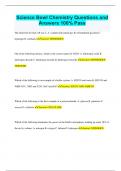
-
Science Bowl Chemistry Questions and Answers 100% Pass
- Exam (elaborations) • 30 pages • 2024
- Available in package deal
-
- $10.49
- + learn more
Science Bowl Chemistry Questions and Answers 100% Pass The ideal fuel for fuel cell use is: A. compressed natural gas B. reformulated gasoline C. hydrogen D. methanol Answer: HYDROGEN Out of the following choices, which is the correct name for N2O3: A. dinitrogen oxide B. dinitrogen dioxide C. dinitrogen trioxide D. dinitrogen tetroxide Answer: DINITROGEN TRIOXIDE Which of the following is an example of a buffer system: A. H2CO3 and water B. H2CO3 and NaHCO3 C. NH3 and N2 D. NaCl...
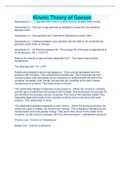
-
Kinetic Theory of Gasses
- Exam (elaborations) • 1 pages • 2023
- Available in package deal
-
- $10.99
- + learn more
Kinetic Theory of Gasses Assumptions: 1 - 1. Gas particles move in a rapid random, straight linear motion. Assumption 2: - The size of gas particles is negligible compared to the distance between them. Assumption 3: - Gas particles don't experience attractions to each other. Assumption 4: - Collisions between gas particles and the walls of the container are perfectly elastic (lose no energy) Assumption 5: - All Particles possess Ek. The average Ek of the gas is proportional to its te...
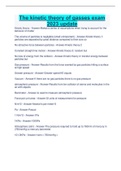
-
The kinetic theory of gasses
- Exam (elaborations) • 1 pages • 2023
- Available in package deal
-
- $10.99
- + learn more
The kinetic theory of gasses exam 2023 update Kinetic theory - Answer-Makes a series of assumptions when trying to account for the behavior of matter The volume of particles is negligible (small unimportant) - Answer-Kinetic theory 1: particles are separated by great distance compared to their size so No attractive force between particles - Answer-Kinetic theory 2 Constant straight line motion - Answer-Kinetic theory 3: random but No loss of energy from the collision - Answer-Kinetic ...

-
CHEMISTRY TEST 3- KINETIC THEORY OF GASSES EXAM REVIEW 2023 UPDATE
- Exam (elaborations) • 2 pages • 2023
- Available in package deal
-
- $11.99
- + learn more
CHEMISTRY TEST 3- KINETIC THEORY OF GASSES EXAM REVIEW 2023 UPDATE What is the kinetic theory of gases? - Correct Answer-1) Gases consist of tiny particles moving in random rapid straight-line motions until they collide with one another or with the walls of the containers. 2) Collisions between particles or with the walls of the container are perfectly elastic. 3) The size of the particles are negligible compared to the size of the container in which they are moving. 4) Any attractive...

-
The Kinetic Theory of Gasses Exam Solution Update (a+)
- Exam (elaborations) • 1 pages • 2023
- Available in package deal
-
- $10.59
- + learn more
The Kinetic Theory of Gasses Exam Solution Update (a+) Do gas particles attract or repel each other? - Correct AnswerNo Gas particles are very spread out so- - Correct AnswerThey can be easily compressed Gas particles are in _______ - Correct AnswerContestant, Straight line, random motion Gasses have elastic collisions which means- - Correct AnswerNo kinetic energy (speed) is lost when gas particles collide with each other or the sides of a container What is Kinetic Energy - Correct Answ...
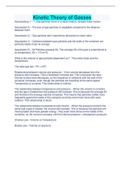
-
Kinetic Theory of Gasses
- Exam (elaborations) • 1 pages • 2023
- Available in package deal
-
- $11.99
- + learn more
Kinetic Theory of Gasses Assumptions: 1 - 1. Gas particles move in a rapid random, straight linear motion. Assumption 2: - The size of gas particles is negligible compared to the distance between them. Assumption 3: - Gas particles don't experience attractions to each other. Assumption 4: - Collisions between gas particles and the walls of the container are perfectly elastic (lose no energy) Assumption 5: - All Particles possess Ek. The average Ek of the gas is proportional to its te...
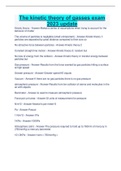
-
The kinetic theory of gasses exam 2023 update
- Exam (elaborations) • 1 pages • 2023
- Available in package deal
-
- $12.49
- + learn more
The kinetic theory of gasses exam 2023 update Kinetic theory - Answer-Makes a series of assumptions when trying to account for the behavior of matter The volume of particles is negligible (small unimportant) - Answer-Kinetic theory 1: particles are separated by great distance compared to their size so No attractive force between particles - Answer-Kinetic theory 2 Constant straight line motion - Answer-Kinetic theory 3: random but No loss of energy from the collision - Answer-Kinetic ...

-
The Kinetic Theory of Gasses Exam Solution Update (a+)
- Exam (elaborations) • 1 pages • 2023
- Available in package deal
-
- $11.99
- + learn more
The Kinetic Theory of Gasses Exam Solution Update (a+) Do gas particles attract or repel each other? - Correct AnswerNo Gas particles are very spread out so- - Correct AnswerThey can be easily compressed Gas particles are in _______ - Correct AnswerContestant, Straight line, random motion Gasses have elastic collisions which means- - Correct AnswerNo kinetic energy (speed) is lost when gas particles collide with each other or the sides of a container What is Kinetic Energy - Correct Answ...
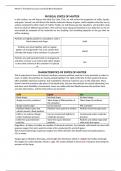
-
CHEM 120 Week 4- The Ideal Gas Laws and Acid:Base Reactions
- Other • 19 pages • 2024
-
- $25.49
- + learn more
Week 4: The Ideal Gas Laws and Acid/Base Reactions PHYSICAL STATES OF MATTER In this section, we will discuss the Ideal Gas Laws. First, we will review the properties of solids, liquids, and gases. Second, we will discuss the kinetic-molecular theory of gases, which explains why they are so unique compared to other states of matter. Finally, we will discuss gas law equations, and practice using them to solve for different parameters. This unit has many strong connections to our daily lives ...

Study stress? For sellers on Stuvia, these are actually golden times. KA-CHING! Earn from your study resources too and start uploading now. Discover all about earning on Stuvia


